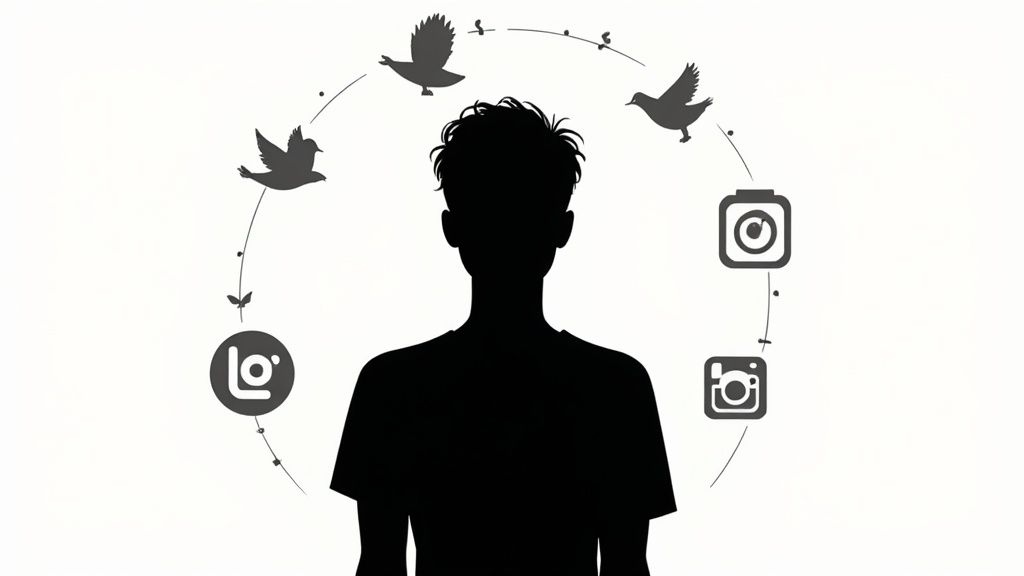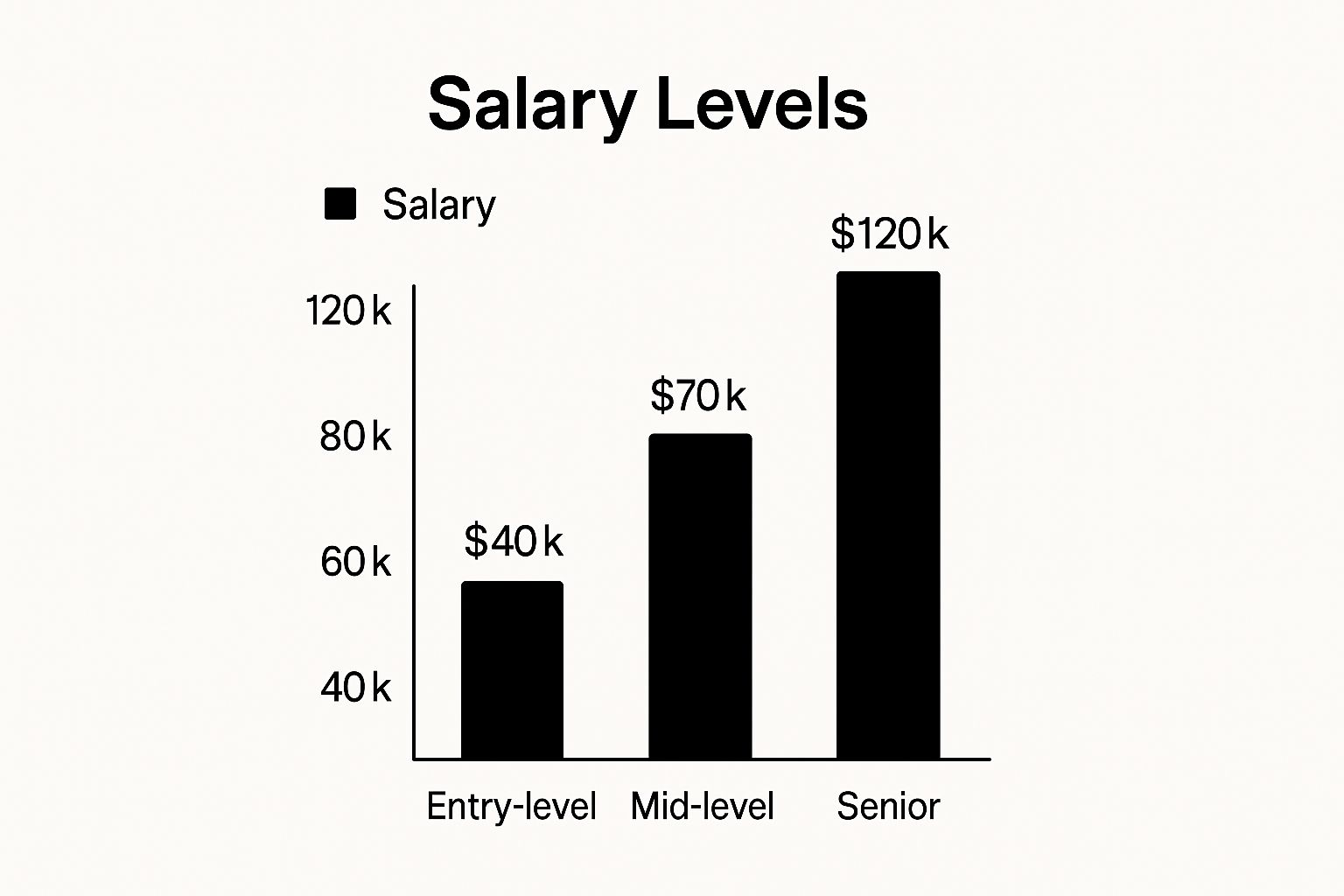
Land Your Dream Influencer Marketing Job
Published
So, you want a job in influencer marketing? It's more than just scrolling through Instagram and finding cool people to post about a product. At its core, an influencer marketing job is about being a master connector—linking brands with the right creators to build real, lasting communities, promote products authentically, and ultimately, drive sales. It’s a dynamic role that demands a unique mix of strategic planning, sharp creative thinking, strong relationship management, and a real comfort with data.
Understanding Today's Influencer Marketing Landscape

Before you even think about polishing your resume, you need a solid grasp of what this industry actually looks like in 2024. Let's be clear: influencer marketing has shed its "fluffy" reputation. It's no longer just a side experiment for brand awareness. Today, it’s a powerhouse marketing channel, a core part of many companies' strategies that directly impacts the bottom line.
The numbers don't lie. This industry has seen some truly staggering growth. What started as a $1.7 billion market back in 2016 is on track to explode to an estimated $32.55 billion by 2025. This isn't just speculative hype; it's backed by real-world results. In fact, a whopping 80% of marketers heading into 2025 believe it's one of the most effective ways to engage customers and convert sales. For a deeper dive, you can check out the full influencer marketing report for more eye-opening stats.
To give you a quick snapshot of why this field is booming, take a look at these key growth metrics. They paint a clear picture of the opportunity waiting for you.
Key Influencer Marketing Industry Growth Metrics
| Metric | Statistic | Significance for Job Seekers |
|---|---|---|
| Market Growth | Projected to reach $32.55 billion in 2025. | This massive growth means more jobs, bigger budgets, and increased career opportunities. |
| Marketer Adoption | 80% of marketers find it effective. | High confidence in the channel ensures its longevity and integration into marketing teams. |
| Budget Increases | 59% of brands planned to increase their influencer budget in 2024. | Companies are investing heavily, signaling a demand for skilled professionals to manage that spend. |
| ROI Perception | 83% of businesses believe influencer marketing delivers ROI. | Proving value is key; you'll be expected to manage campaigns that deliver measurable results. |
These figures show a thriving, mature industry. Your ability to speak to this growth and its implications will immediately signal to hiring managers that you've done your homework.
The Big Shift Toward Authentic Connections
One of the most important changes I've seen over the years is the move away from chasing mega-celebrities with millions of followers. Those huge, flashy partnerships still have their place, but the real magic is now happening with smaller creators. We're talking about micro- and nano-influencers.
These are people with maybe a few thousand followers, but their audience is incredibly engaged and trusts them implicitly. Why the shift? It’s all about authenticity. Consumers are smarter than ever and can spot a disingenuous, paid-for post from a mile away. A recommendation from a nano-influencer feels more like advice from a trusted friend than a slick ad, which translates to much higher engagement and better conversion rates.
If you want to land an influencer marketing job, you absolutely must understand how to find, vet, and build genuine relationships with these niche creators. It's a non-negotiable skill.
The modern influencer marketing professional isn't just a campaign manager; they are a community builder and a relationship broker. Success hinges on fostering genuine partnerships that resonate with both the creator's audience and the brand's values.
Data and Tech Are Now Front and Center
The days of just tracking likes and comments to gauge success are long gone. Today's influencer marketing roles are deeply analytical. You'll be living in spreadsheets and dashboards, tracking key performance indicators (KPIs) to prove a tangible return on investment (ROI).
Get comfortable with these terms, because you'll be using them daily:
- Engagement Rate: The lifeblood of any campaign. It’s the percentage of an influencer's audience that actually interacts with their content.
- Conversion Rate: This is where the money is. It tracks how many followers took a specific action, like buying a product or signing up for a list.
- Cost Per Acquisition (CPA): A critical business metric. It tells you exactly how much you spent to get one new customer through your campaign.
- Earned Media Value (EMV): This estimates the dollar value of the organic buzz and exposure your campaign generated. Think of it as the PR value you didn't have to pay for.
On top of that, technology is playing a much bigger role. AI-powered platforms like Upfluence or GRIN are becoming standard tools for identifying the right influencers, spotting fraudulent followers, and even forecasting campaign performance.
Being able to discuss these data points and technological trends intelligently in an interview is what separates a good candidate from a great one. This isn't just background noise—it's the fundamental knowledge you need to build a successful career and land that dream influencer marketing job.
What Skills Do Hiring Managers Actually Want?
Landing a great job in influencer marketing goes way beyond just loving social media. It’s one of those roles that’s equal parts analyst, creative director, and diplomat. Hiring managers are looking for a very specific mix of skills that proves you can manage campaigns, build relationships, and, most importantly, deliver real results.
To get noticed, you have to show you're the complete package. This isn't about surface-level knowledge; it's about building the specific capabilities that companies are betting their budgets on.
The Hard Skills: Your Technical Foundation
Let’s start with the hard skills. These are the practical, teachable abilities that show you can handle the mechanics of the job from day one. Think of these as the foundation you build everything else on.
If you want to get serious, here’s where you need to focus:
- Data Analysis & Reporting: You have to be comfortable with the numbers. I'm talking about tracking key performance indicators (KPIs) like engagement rates, click-throughs (CTR), conversions, and the ultimate metric: return on investment (ROI). It's not enough to run a campaign; you must be able to pull that data and tell a clear story with it.
- Budget Management: Whether you’re handling $5,000 or $500,000, managing a campaign budget is a core part of the job. You’ll need to know how to slice up the pie between creator fees, product seeding, and other costs to get the most bang for your buck.
- Platform Proficiency: Getting your hands on industry-standard platforms like Aspire, Grin, or Upfluence is a massive plus. These are the tools of the trade for finding creators, managing campaigns, and reporting. Mentioning you've used them before tells a manager you can hit the ground running.
- Contract Negotiation: You’ll be the one creating and negotiating contracts with creators. This means getting comfortable with terms like usage rights, exclusivity, and payment schedules to protect the brand while keeping things fair and clear for the influencer.
The candidates who get hired are the ones who can connect a creative idea to a business goal. Saying, "This campaign should drive a 15% lift in site traffic and a 3% conversion rate based on similar activations" is infinitely more powerful than just, "This will be a really cool campaign."
The Soft Skills That Seal the Deal
While hard skills might get your resume noticed, it's the soft skills that truly make you successful in this field. These are the people skills, the ones that are harder to teach but absolutely essential for managing the human side of influencer marketing.
Put it this way: hard skills manage the campaign, but soft skills manage the people.
Essential Soft Skills for Your Toolkit
| Soft Skill | Why It Matters So Much |
|---|---|
| Relationship Building | Your success hinges on your ability to build genuine, long-term partnerships with creators. It's not just a transaction—it's about earning mutual respect and trust. |
| Creative & Strategic Thinking | You need the creative spark to dream up unique campaign ideas and the strategic mind to make sure those ideas actually serve the brand's goals and connect with the right audience. |
| Communication Skills | Get ready to communicate constantly—with creators, your internal team, and company leadership. Being clear, concise, and professional is what keeps everyone on the same page. |
| Adaptability | Social media changes in the blink of an eye. The platform that’s hot today could be old news tomorrow. You have to be able to pivot your strategy without missing a beat. |
To really stand out, you have to become a student of the craft. That means digging into what makes audiences tick. A great starting point is to study proven strategies to boost social media engagement and think about how they translate to creator partnerships. For an even deeper look, check out our comprehensive guide on the most critical influencer marketing skills employers are searching for.
Building these skills doesn’t happen by accident. It comes from real-world practice, whether you're working on personal projects, landing an internship, or even volunteering to help a small business. The goal is to walk into an interview ready with concrete examples of how you used these skills to get a specific, tangible result.
How to Build a Portfolio Without Experience

It’s the classic chicken-and-egg problem, right? You need experience to get hired, but you need a job to get that experience. For aspiring influencer marketers, the portfolio is your secret weapon to break this cycle. It's how you prove to a hiring manager that you don’t just talk about strategy—you can actually think strategically.
Don't let a blank resume hold you back. You can build a genuinely impressive portfolio from scratch, and it's more straightforward than you might think. The key is to create a few mock campaign proposals for real brands you admire. This isn't just theory; it’s a proactive way to showcase your initiative, creativity, and real-world understanding of how a campaign comes to life.
Choose Your Brands Wisely
Your first move is to pick two or three brands to build your mock campaigns around. This is a crucial step because your choices say a lot about your industry knowledge and passion. Select companies whose marketing you genuinely follow and whose products you understand.
To really show off your range, I recommend picking a mix of brands:
- A household name: Think of a big, established company like a major athletic brand or a CPG giant.
- A scrappy DTC startup: Choose a trendy beverage, a niche skincare line, or any direct-to-consumer brand you've seen blow up on social media.
- A local business or non-profit: Pick something you’re personally invested in, like a local coffee shop or an animal shelter.
This variety demonstrates that you can adapt your thinking to different budgets, business objectives, and team sizes. For each brand, you'll put on your strategist hat and build a complete campaign proposal from the ground up, just like you would if you were on their team.
Constructing Your Mock Campaign Proposal
Every mock campaign in your portfolio should be a standalone case study. It needs to tell a compelling story and clearly walk someone through your thought process. Imagine you’re presenting this to a marketing director to get their sign-off and budget.
A solid proposal has a few essential parts that prove you’ve considered the entire process. This structure makes it incredibly easy for a hiring manager to see your potential for an influencer marketing role.
Core Elements of Your Mock Proposal
| Component | What to Include | Why It's Important |
|---|---|---|
| Campaign Goal | A single, clear objective. For example: "Increase trial for the new energy drink among female college students by 15%." | It shows you grasp that campaigns must drive real business results, not just generate vague "buzz." |
| Target Audience | A detailed persona. Go beyond basic demographics and include interests, online habits, and pain points. | This proves you can pinpoint and truly understand a niche audience—a critical skill for picking the right influencers. |
| Creative Concept | A brief but exciting campaign idea. Think a TikTok challenge, an Instagram "day-in-the-life" takeover, or a YouTube series. | This is where you show off your creative flair and your knack for ideas that feel native to the platform. |
| Influencer Selection | A list of 3-5 real influencers you'd partner with. Justify each choice based on their audience alignment, engagement rate, and brand fit. | This is the heart of the job. It demonstrates your ability to vet creators and strategically match them to a campaign. |
Going through this exercise proves you can do the work before you even have the job title. It's tangible proof of your skills, which will always speak louder than a bullet point on a resume.
Your portfolio is not just a collection of work; it's a strategic argument for why you should be hired. Each mock campaign is a piece of evidence proving you can translate a brand's goals into a real-world influencer strategy.
Presenting Your Work Professionally
How you package your portfolio is just as important as what's inside. A sloppy or confusing presentation can completely undermine all your hard work. The good news? You don't need to be a design wizard to create something polished and professional.
There are plenty of free and user-friendly tools you can use:
- Canva: This is perfect for creating sleek, professional-looking PDFs or slide decks for each mock campaign. Start with a clean template to keep everything looking sharp.
- A Personal Website: Platforms like Carrd, Wix, or even a simple Google Site can serve as a central hub for your work. This gives you a single, professional link to add to your resume and LinkedIn profile.
Even with zero "official" experience, you can build a compelling case for yourself. A strong portfolio, combined with a resume that highlights your new projects, makes a powerful first impression. Learning how to approach writing a resume with no experience will help you frame these mock campaigns in a way that truly showcases your potential.
By taking the initiative to create these proposals, you're not just saying you have the skills—you're proving it. You’re building the evidence that shows you’re ready for your first influencer marketing job.
Finding and Applying for the Right Roles

Alright, your portfolio is polished and your skills are sharp. Now comes the exciting part: landing the actual job. But let's be real, endlessly scrolling through job boards is a surefire way to burn out. A truly effective job search is more like a targeted campaign—you need to know where to look, how to pitch yourself, and how to uncover those amazing opportunities that aren't plastered everywhere.
This is where you shift from being just another applicant to a standout candidate. Before you even send that first resume, it's smart to explore expert strategies to increase your online presence. In this industry, your digital footprint is your resume before the resume.
Cracking the Code on Influencer Marketing Job Titles
One of the first things you'll notice is that job titles in this field are all over the place. Understanding the lingo is your first step to making sure you're applying for a role that actually matches your skills and ambitions.
Here’s a quick guide to what these common titles really mean:
- Influencer Marketing Coordinator: Think of this as the engine room. It’s often an entry-level gig where you’ll handle the nitty-gritty details. We're talking product seeding (getting freebies out to creators), tracking shipments, pulling basic campaign reports, and keeping the creator database organized and up-to-date.
- Influencer Marketing Manager: This is where strategy comes into play. As a manager, you’re the one developing campaign ideas, juggling budgets, negotiating contracts, and building solid relationships with creators and their agents. You're steering the ship.
- Creator Partnerships Manager: The title says it all—this role is all about relationships. It’s very similar to a manager position but with a laser focus on finding, vetting, and nurturing long-term brand ambassadors who truly love the brand.
Knowing these differences is crucial. If you're going for a Coordinator role, pack your resume with examples of your killer organizational skills. Applying for a Manager position? That’s when you lead with the strategic wins from your portfolio.
Where to Uncover the Hidden Gems
Let’s be honest: the best jobs often get snapped up before they ever hit the big job boards. If you're only looking on LinkedIn or Indeed, you're missing out. To get a real edge, you have to dig a little deeper.
Go straight to the brands and agencies you admire. Pick your top 10-15 dream companies and bookmark their career pages. They almost always post new roles there first. You should also immerse yourself in the industry by joining niche Slack or Geneva communities for marketing pros. I’ve seen recruiters drop incredible opportunities in these private groups long before they go public.
Pro Tip: Don't just be an applicant; be a presence. Follow your target companies on social media, comment thoughtfully on their posts, and connect with people on their marketing teams. A warm application from a familiar name will always stand out from a cold one in a stack of a hundred others.
This groundwork pays off. While you’re networking, you can also keep an eye on curated job lists. For instance, we're constantly updating our list of the top influencer marketing jobs with remote options in 2025 to make your search easier.
Nailing Your Application Materials
Think of your resume and LinkedIn profile as your personal ad campaign. You have just a few seconds to catch a recruiter's eye, so every word counts. Sprinkle in keywords you see in job descriptions, like "campaign management," "creator outreach," and "performance tracking."
The most important thing? Put numbers on your achievements, even if they're from your mock portfolio projects.
Your Application Tune-Up Checklist
| Material | How to Make It Shine | Real-World Example |
|---|---|---|
| Resume | Ditch vague duties for results-driven accomplishments. | Instead of "Managed campaigns," try: "Developed a mock campaign projected to drive a 12% engagement rate, exceeding industry benchmarks." |
| LinkedIn Profile | Use a clean, professional headshot and a headline that screams your career goal. | Something like: "Aspiring Influencer Marketing Manager |
| Portfolio Link | Make that link impossible to miss. Put it front and center. | Add it to your LinkedIn "Featured" section and right in your resume header next to your contact info. |
This level of detail signals that you're a serious professional who knows how to communicate value. It's especially important in an industry obsessed with engagement metrics. For example, knowing that smaller TikTok accounts can hit engagement rates of 15.04%—dwarfing Instagram's 2.05% average—shows you're on top of your game. Being able to discuss these trends makes you a much more compelling candidate.
You’ve done the hard work. You built the skills, crafted a killer portfolio, and now you’ve landed the interview. This is where it all comes together.
Answering questions in an influencer marketing interview isn't just about reciting the "right" answers. It’s your chance to show them your strategic mind, your creative flair, and your deep, practical understanding of this industry's unique quirks.
This is the moment you prove you’re not just another applicant—you’re the solution to their marketing challenges.
Acing Your Interview and Getting the Offer
The best interviews are won before you even step into the room (or log into the Zoom call). Seriously. Preparation is what separates a fumbling, nervous candidate from a confident, strategic partner. Hiring managers can spot someone who’s done their homework a mile away, and it instantly puts you in their good graces.
Before you talk to anyone, you need to have solid answers to these questions:
- Who are their current influencers? Dig into their recent partnerships. Are they all about mega-stars, or do they lean on a network of micro-creators? What does their choice of talent tell you about their overall strategy?
- What was their best campaign? Pinpoint a recent influencer campaign of theirs that you genuinely thought was brilliant. Be ready to break down why it worked, pointing to specific content or results if you can find them.
- What was their biggest miss? This one is tricky but powerful. Find a campaign that felt a bit off-brand or seemed to fall flat. Prepare some thoughtful, constructive ideas on how you might have approached it differently. This shows you’re a critical thinker, not just a cheerleader.
This level of research proves you’re not just blasting out resumes; you're genuinely invested in their brand. And if your interview is virtual, don't forget the tech side of prep. For a deeper dive, our guide to mastering your next online interview will help you iron out all the details.
Answering the Questions That Really Matter
Hiring managers will throw a mix of behavioral, situational, and strategic questions your way. They want to see how you think on your feet and handle the messy reality of campaign management. It's less about memorizing answers and more about having a solid framework to tackle whatever comes at you.
A great answer always connects back to a business objective. Whether discussing creativity or creator relationships, anchor your response in how it ultimately drives results like brand affinity, customer acquisition, or revenue.
Let's walk through some of the most common—and revealing—questions you're likely to face.
Answering interview questions well requires understanding the intent behind them. This table breaks down some common questions, what the interviewer is really trying to learn, and how you can frame a powerful response.
Common Interview Questions and How to Answer Them
| Interview Question | What They Are Really Asking | Effective Answer Strategy |
|---|---|---|
| How do you measure campaign ROI? | "Can you prove the value of your work with data? Do you understand business goals beyond likes and comments?" | Detail a multi-layered approach. Talk about awareness metrics (impressions, reach, EMV) for top-of-funnel goals and performance metrics (CTR, coupon codes, CPA) for conversion-focused campaigns. Show you can connect spend to results. |
| How would you handle a difficult creator partnership? | "Are you a problem-solver? Can you manage conflict professionally and protect the brand's interests without burning bridges?" | Outline a clear, professional process. Start with reviewing the contract/brief, then move to open communication to understand the creator's perspective. Emphasize finding a collaborative solution that honors the partnership while meeting campaign goals. |
| Which influencers would you choose for our brand and why? | "Have you done your research? Do you understand our target audience and brand voice? Can you think strategically about talent?" | Don't just name-drop popular creators. Suggest 2-3 specific influencers (ideally micro or mid-tier) and justify why they are a perfect fit based on their audience demographics, engagement, content style, and alignment with the company's values. |
| Tell me about a campaign that failed. What did you learn? | "Are you accountable? Can you learn from your mistakes and apply those lessons to future work?" | Be honest but strategic. Choose a real, low-stakes example where something went wrong (e.g., a post underperformed, a timeline was missed). Focus 80% of your answer on what you learned and the specific process changes you implemented to prevent it from happening again. |
Having these frameworks in mind will help you stay calm and deliver thoughtful, impressive answers that showcase your true expertise.
Show You're Focused on the Future
Nothing impresses a hiring manager more than a candidate who understands where the industry is headed. Companies want to hire people who can see around the corner, not just manage the day-to-day.
A huge trend right now is the shift in marketing budgets. A recent study found that nearly half (47%) of marketers plan to prioritize long-term influencer partnerships over one-off campaigns in 2025. This signals a move toward more authentic, sustainable relationships. Being able to speak intelligently about this—and other shifts like performance-based pay models—proves you're a forward-thinker.
And as you think about your future, it helps to know the potential career trajectory. This chart gives you a sense of how compensation can grow as you gain experience.

As you can see, there's significant room for financial growth as you move from coordinating campaigns to leading strategy.
Asking Smart Questions to Seal the Deal
Remember, an interview is a two-way street. The questions you ask at the end are just as revealing as the answers you gave. Ditch the generic questions about company culture and ask things that show you’re already thinking like a key member of the team.
Try one of these:
- "What's the biggest challenge this team is facing right now that my role would directly help solve?"
- "Could you walk me through your current process for creator sourcing and vetting?"
- "Can you share an example of a recent campaign you consider a huge success and what you think made it so effective?"
These kinds of questions position you as a proactive, strategic thinker who is ready to hit the ground running. By combining deep preparation with thoughtful answers and insightful questions, you’re not just interviewing for a job—you’re making an undeniable case for why you’re the one who gets the offer.
Got Questions About Influencer Marketing Careers? Let’s Get Them Answered.
As you start exploring a career in influencer marketing, you’re bound to have some questions. It’s a dynamic field, and things are always changing. What was standard practice last year might be totally different now. So, let's tackle some of the most common questions head-on to give you a clear path forward.
Think of this as your personal cheat sheet for breaking into this exciting space.
What Kind of Salary Can I Realistically Expect?
Alright, let's get down to the numbers. If you're just starting out in a role like an Influencer Marketing Coordinator, a realistic salary in the U.S. falls somewhere in the $45,000 to $60,000 range. Of course, this can definitely skew higher in major hubs like New York or Los Angeles where the cost of living is steeper.
Once you’ve got a couple of years of experience under your belt and step into a manager-level position, you’ll see those numbers jump. It's not uncommon for manager roles to command salaries between $60,000 and $85,000+. Your final compensation will really depend on the company's size, your specific responsibilities, and the industry you're in.
Don't just focus on the base salary. Many manager-level roles (and above) come with performance bonuses tied to how well your campaigns do. Hitting those KPIs can seriously boost your total earnings.
Do I Absolutely Need a Specific Degree?
Honestly? No. While a degree in Marketing, Communications, or something similar is a great foundation and looks good on paper, it's not the be-all and end-all. In this industry, hands-on experience and proven skills often carry more weight than a specific diploma.
Hiring managers are far more interested in what you can actually do.
- Your Portfolio is Your Proof: A well-built portfolio with mock campaigns, strategic thinking, and a clear understanding of social platforms is way more compelling than a degree alone.
- Certifications Show You're Serious: Completing certifications in social media analytics, digital marketing, or specific influencer platforms shows initiative and gives you a real competitive edge.
- Show, Don't Just Tell: Have you grown your own niche social media account? That kind of self-starter project is a massive green flag for employers.
Ultimately, they want to see that you can think like a marketer and get the job done.
What Are the Must-Have Tools I Should Learn?
To really stand out and be ready to contribute from day one, you need to be comfortable with a few core types of software. Getting a handle on these will make you a much stronger candidate.
First, get your hands on some influencer management platforms. These are the workhorses of the industry, where all the magic happens. A few big names to know are:
Next, you have to master native analytics. You need to be able to dive right into the platforms themselves and pull out meaningful insights.
- Instagram Insights
- TikTok Analytics
- YouTube Studio Analytics
- Google Analytics (essential for tracking how influencer traffic converts on a website)
Finally, don't sleep on project management tools. A single campaign has a million moving pieces, from contracts to content approvals. Showing you’re proficient in a tool like Asana, Trello, or Monday.com proves you can keep everything organized and on schedule.
Ready to put this knowledge to work? Influencer Marketing Jobs is the #1 job board connecting talented people just like you with the best opportunities in the business. Explore our curated listings to find your next full-time, part-time, or remote role.